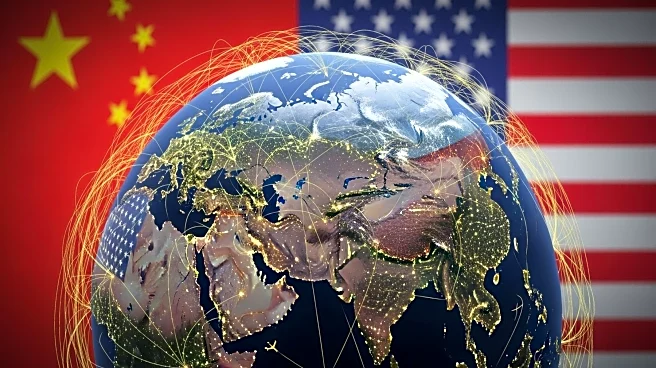What's Happening?
Major Chinese airlines have expressed opposition to a proposal by the Trump administration to prohibit them from flying over Russia on routes to and from the United States. The U.S. Transportation Department suggested this ban, arguing that the shorter
flight times for Chinese airlines give them an unfair advantage over American carriers. In response, six Chinese airlines, including China Eastern, Air China, and China Southern, have submitted letters to the USDOT, highlighting the potential negative impacts of the proposal. They argue that the ban would extend flight times by two to three hours, increase fuel consumption, and disrupt passenger travel plans, particularly during the peak holiday season. United Airlines has also weighed in, urging the Trump administration to extend the prohibition to Cathay Pacific and other Hong Kong-based carriers. The backdrop to this issue is Russia's decision to bar U.S. airlines from its airspace, a move made in retaliation for the U.S. banning Russian flights over its territory following Russia's invasion of Ukraine in March 2022.
Why It's Important?
The proposed flight restrictions have significant implications for international travel and trade between the U.S. and China. If implemented, the ban could lead to increased travel costs and longer flight durations, affecting thousands of passengers and potentially disrupting business operations. The move also highlights ongoing geopolitical tensions between the U.S. and Russia, with airlines caught in the crossfire. For American carriers, the proposal aims to level the playing field by addressing perceived competitive disadvantages. However, it could also strain U.S.-China relations, impacting diplomatic and economic exchanges. The situation underscores the complex interplay between international policy decisions and global commerce, with airlines and passengers bearing the brunt of political disputes.
What's Next?
The U.S. Transportation Department will need to consider the feedback from Chinese airlines and other stakeholders before making a final decision on the proposed ban. The outcome could influence future negotiations between the U.S. and China regarding air travel and broader trade relations. Airlines for America, representing major U.S. carriers, has called for maintaining parity in passenger flight availability between the two countries, suggesting that any decision should reflect market demand. As discussions continue, stakeholders will be closely monitoring potential adjustments to flight routes and schedules, as well as any diplomatic efforts to resolve the underlying geopolitical tensions.
Beyond the Headlines
The proposed flight restrictions could have broader implications for international aviation policies and the global airline industry. The situation raises questions about the role of government intervention in competitive markets and the balance between national security concerns and economic interests. Additionally, the issue highlights the vulnerability of global travel networks to political conflicts, emphasizing the need for collaborative solutions that prioritize passenger welfare and industry stability. Long-term, the dispute may prompt airlines to explore alternative routes and strategies to mitigate the impact of geopolitical tensions on their operations.
















